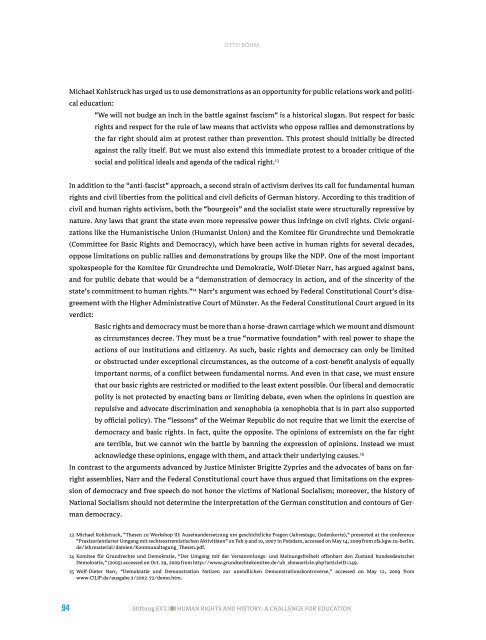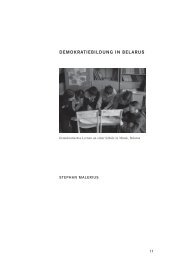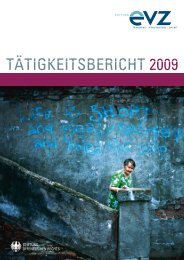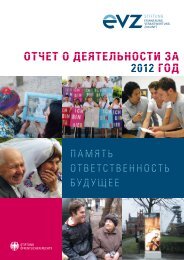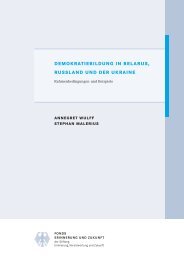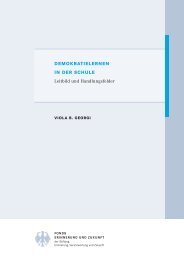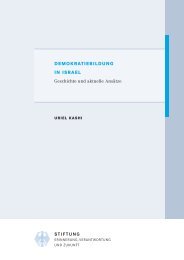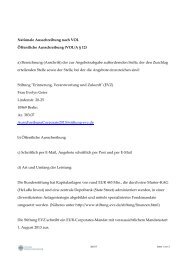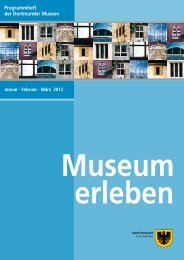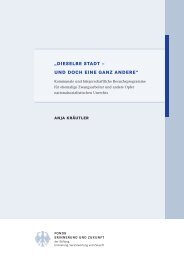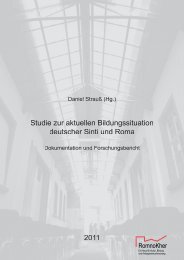chapter 2 - Stiftung "Erinnerung, Verantwortung und Zukunft"
chapter 2 - Stiftung "Erinnerung, Verantwortung und Zukunft"
chapter 2 - Stiftung "Erinnerung, Verantwortung und Zukunft"
Create successful ePaper yourself
Turn your PDF publications into a flip-book with our unique Google optimized e-Paper software.
Otto Böhm<br />
Michael Kohlstruck has urged us to use demonstrations as an opportunity for public relations work and political<br />
education:<br />
“We will not budge an inch in the battle against fascism” is a historical slogan. But respect for basic<br />
rights and respect for the rule of law means that activists who oppose rallies and demonstrations by<br />
the far right should aim at protest rather than prevention. This protest should initially be directed<br />
against the rally itself. But we must also extend this immediate protest to a broader critique of the<br />
social and political ideals and agenda of the radical right. 13<br />
In addition to the “anti-fascist” approach, a second strain of activism derives its call for f<strong>und</strong>amental human<br />
rights and civil liberties from the political and civil deficits of German history. According to this tradition of<br />
civil and human rights activism, both the “bourgeois” and the socialist state were structurally repressive by<br />
nature. Any laws that grant the state even more repressive power thus infringe on civil rights. Civic organizations<br />
like the Humanistische Union (Humanist Union) and the Komitee für Gr<strong>und</strong>rechte <strong>und</strong> Demokratie<br />
(Committee for Basic Rights and Democracy), which have been active in human rights for several decades,<br />
oppose limitations on public rallies and demonstrations by groups like the NDP. One of the most important<br />
spokespeople for the Komitee für Gr<strong>und</strong>rechte <strong>und</strong> Demokratie, Wolf-Dieter Narr, has argued against bans,<br />
and for public debate that would be a “demonstration of democracy in action, and of the sincerity of the<br />
state’s commitment to human rights.” 14 Narr’s argument was echoed by Federal Constitutional Court’s disagreement<br />
with the Higher Administrative Court of Münster. As the Federal Constitutional Court argued in its<br />
verdict:<br />
Basic rights and democracy must be more than a horse-drawn carriage which we mount and dismount<br />
as circumstances decree. They must be a true “normative fo<strong>und</strong>ation” with real power to shape the<br />
actions of our institutions and citizenry. As such, basic rights and democracy can only be limited<br />
or obstructed <strong>und</strong>er exceptional circumstances, as the outcome of a cost-benefit analysis of equally<br />
important norms, of a conflict between f<strong>und</strong>amental norms. And even in that case, we must ensure<br />
that our basic rights are restricted or modified to the least extent possible. Our liberal and democratic<br />
polity is not protected by enacting bans or limiting debate, even when the opinions in question are<br />
repulsive and advocate discrimination and xenophobia (a xenophobia that is in part also supported<br />
by official policy). The “lessons” of the Weimar Republic do not require that we limit the exercise of<br />
democracy and basic rights. In fact, quite the opposite. The opinions of extremists on the far right<br />
are terrible, but we cannot win the battle by banning the expression of opinions. Instead we must<br />
acknowledge these opinions, engage with them, and attack their <strong>und</strong>erlying causes. 15<br />
In contrast to the arguments advanced by Justice Minister Brigitte Zypries and the advocates of bans on farright<br />
assemblies, Narr and the Federal Constitutional court have thus argued that limitations on the expression<br />
of democracy and free speech do not honor the victims of National Socialism; moreover, the history of<br />
National Socialism should not determine the interpretation of the German constitution and contours of German<br />
democracy.<br />
13 Michael Kohlstruck, “Thesen zu Workshop III: Auseinandersetzung um geschichtliche Fragen (Jahrestage, Gedenkorte),” presented at the conference<br />
“Praxisorientierter Umgang mit rechtsextremistischen Aktivitäten” on Feb.9 and 10, 2007 in Potsdam, accessed on May 14, 2009 from zfa.kgw.tu-berlin.<br />
de/lehrmaterial/dateien/Kommunaltagung_Thesen.pdf.<br />
14 Komitee für Gr<strong>und</strong>rechte <strong>und</strong> Demokratie, “Der Umgang mit der Versammlungs- <strong>und</strong> Meinungsfreiheit offenbart den Zustand b<strong>und</strong>esdeutscher<br />
Demokratie,” (2005) accessed on Oct. 29, 2009 from http://www.gr<strong>und</strong>rechtekomitee.de/ub_showarticle.php?articleID=149.<br />
15 Wolf-Dieter Narr, “Demokratie <strong>und</strong> Demonstration Notizen zur unendlichen Demonstrationskontroverse,” accessed on May 12, 2009 from<br />
www.CILIP.de/ausgabe 2/2002-72/demo.htm.<br />
94<br />
<strong>Stiftung</strong> EVZ<br />
HUMAN RIGHTS AND HISTORY: A CHALLENGE FOR EDUCATION


